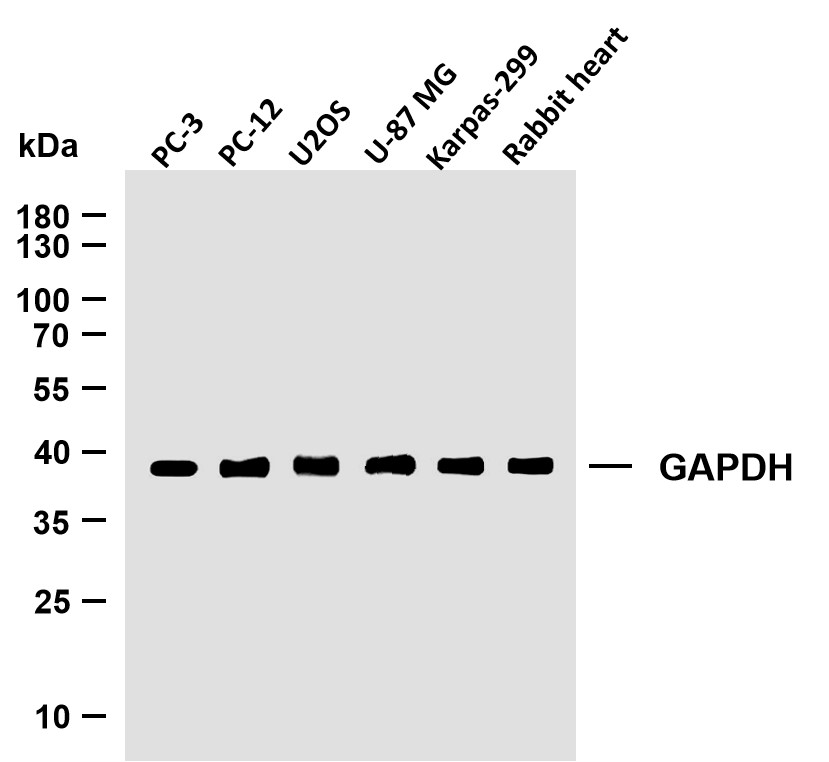
Catalog: YM1326
Size
Price
Status
Qty.
200μL
$450.00
3 weeks
0
100μL
$280.00
3 weeks
0
40μL
$160.00
3 weeks
0
Add to cart


Collected


Collect
Main Information
Target
Beclin 1
Host Species
Mouse
Reactivity
Human, Mouse, Rat, Monkey, Hamster
Applications
WB, IP
MW
55kD (Observed)
Conjugate/Modification
Unmodified
Detailed Information
Recommended Dilution Ratio
WB 1:1000; IP 1:50-200
Formulation
Liquid in PBS containing 50% glycerol, 0.5% BSA and 0.02% sodium azide.
Specificity
This antibody detects endogenous levels of Beclin 1 and does not cross-react with related proteins.
Purification
The antibody was affinity-purified from mouse ascites by affinity-chromatography using epitope-specific immunogen.
Storage
-15°C to -25°C/1 year(Do not lower than -25°C)
MW(Observed)
55kD
Modification
Unmodified
Clonality
Monoclonal
Related Products
Antigen&Target Information
Immunogen:
Purified recombinant human Beclin 1 protein fragments expressed in E.coli.
show all
Specificity:
This antibody detects endogenous levels of Beclin 1 and does not cross-react with related proteins.
show all
Gene Name:
becn1
show all
Other Name:
APG6 ;
ATG 6 ;
ATG6 ;
ATG6 autophagy related 6 homolog ;
Bcl-2-interacting protein beclin ;
Beclin 1 ;
coiled coil moesin like BCL2 interacting protein ;
Beclin 1 autophagy related ;
Beclin-1 ;
Beclin1 ;
BECN 1 ;
BECN1 ;
BECN1_HUMAN ;
Coiled coil myosin like BCL2 interacting protein ;
Coiled-coil myosin-like BCL2-interacting protein ;
GT197 ;
Protein GT197 ;
VPS 30 ;
VPS30.
ATG 6 ;
ATG6 ;
ATG6 autophagy related 6 homolog ;
Bcl-2-interacting protein beclin ;
Beclin 1 ;
coiled coil moesin like BCL2 interacting protein ;
Beclin 1 autophagy related ;
Beclin-1 ;
Beclin1 ;
BECN 1 ;
BECN1 ;
BECN1_HUMAN ;
Coiled coil myosin like BCL2 interacting protein ;
Coiled-coil myosin-like BCL2-interacting protein ;
GT197 ;
Protein GT197 ;
VPS 30 ;
VPS30.
show all
Background:
beclin 1(BECN1) Homo sapiens This gene encodes a protein that regulates autophagy, a catabolic process of degradation induced by starvation. The encoded protein is a component of the phosphatidylinositol-3-kinase (PI3K) complex which mediates vesicle-trafficking processes. This protein is thought to play a role in multiple cellular processes, including tumorigenesis, neurodegeneration and apoptosis. Alternative splicing results in multiple transcript variants. [provided by RefSeq, Sep 2015],
Function:
Function:Plays a central role in autophagy (By similarity). May play a role in antiviral host defense. Protects against infection by a neurovirulent strain of Sindbis virus.,similarity:Belongs to the beclin family.,subcellular location:Expressed in dendrites and cell bodies of cerebellar Purkinje cells.,subunit:Interacts with GOPC and GRID2. Interacts with AMBRA1. Probably forms a complex with AMBRA1 and PIK3C3 (By similarity). Interacts with BCL2 and BCL2L1.,tissue specificity:Ubiquitous.,
show all
Cellular Localization:
Cytoplasm . Golgi apparatus, trans-Golgi network membrane ; Peripheral membrane protein . Endosome membrane ; Peripheral membrane protein . Endoplasmic reticulum membrane ; Peripheral membrane protein . Mitochondrion membrane ; Peripheral membrane protein . Endosome . Cytoplasmic vesicle, autophagosome . Interaction with ATG14 promotes translocation to autophagosomes. Expressed in dendrites and cell bodies of cerebellar Purkinje cells (By similarity). .; [Beclin-1-C 35 kDa]: Mitochondrion . Nucleus . Cytoplasm .; [Beclin-1-C 37 kDa]: Mitochondrion .
show all
Tissue Expression:
Ubiquitous.
show all
Research Areas:
>>Autophagy - other ;
>>Mitophagy - animal ;
>>Autophagy - animal ;
>>Apoptosis - multiple species ;
>>Apelin signaling pathway ;
>>Alzheimer disease ;
>>Amyotrophic lateral sclerosis ;
>>Huntington disease ;
>>Spinocerebellar ataxia ;
>>Pathways of neurodegeneration - multiple diseases ;
>>Shigellosis ;
>>Kaposi sarcoma-associated herpesvirus infection
>>Mitophagy - animal ;
>>Autophagy - animal ;
>>Apoptosis - multiple species ;
>>Apelin signaling pathway ;
>>Alzheimer disease ;
>>Amyotrophic lateral sclerosis ;
>>Huntington disease ;
>>Spinocerebellar ataxia ;
>>Pathways of neurodegeneration - multiple diseases ;
>>Shigellosis ;
>>Kaposi sarcoma-associated herpesvirus infection
show all
Signaling Pathway
Cellular Processes >> Transport and catabolism >> Autophagy - animal
Cellular Processes >> Transport and catabolism >> Mitophagy - animal
Cellular Processes >> Cell growth and death >> Apoptosis - multiple species
Human Diseases >> Neurodegenerative disease >> Alzheimer disease
Human Diseases >> Neurodegenerative disease >> Amyotrophic lateral sclerosis
Human Diseases >> Neurodegenerative disease >> Huntington disease
Human Diseases >> Neurodegenerative disease >> Spinocerebellar ataxia
Human Diseases >> Neurodegenerative disease >> Pathways of neurodegeneration - multiple diseases
Environmental Information Processing >> Signal transduction >> Apelin signaling pathway
Reference Citation({{totalcount}})
Catalog: YM1326
Size
Price
Status
Qty.
200μL
$450.00
3 weeks
0
100μL
$280.00
3 weeks
0
40μL
$160.00
3 weeks
0
Add to cart


Collected


Collect
Recently Viewed Products
Clear allPRODUCTS
CUSTOMIZED
ABOUT US
Toggle night Mode
{{pinfoXq.title || ''}}
Catalog: {{pinfoXq.catalog || ''}}
Filter:
All
{{item.name}}
{{pinfo.title}}
-{{pinfo.catalog}}
Main Information
Target
{{pinfo.target}}
Reactivity
{{pinfo.react}}
Applications
{{pinfo.applicat}}
Conjugate/Modification
{{pinfo.coupling}}/{{pinfo.modific}}
MW (kDa)
{{pinfo.mwcalc}}
Host Species
{{pinfo.hostspec}}
Isotype
{{pinfo.isotype}}
Product {{index}}/{{pcount}}
Prev
Next
{{pvTitle}}
Scroll wheel zooms the picture
{{pvDescr}}






















